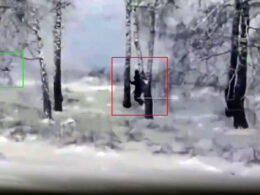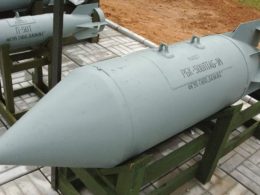Ukraine has not abandoned its request for cluster munitions from the United States, including the MK-20 air-launched bomb, whose individual munitions it wants drop from drones, Reuters reports citing US lawmakers Jason Crow and Adam Smith.
They said Ukrainian officials urged US lawmakers to lobby the White House at the Munich Security Conference last month to provide MK-20s. The bombs were requested with 155-millimeter artillery shells.
The lawmakers added that Ukraine sees the cluster munitions as a way to stop the "human wave" tactics that Russia has been actively using in recent months to assault settlements in the east, most notably Bakhmut.
In particular, Smith said, the Ukrainian military believes that MK-20s "have better armor penetration" than the weapons they are currently dropping from drones.
MK-20s are usually dropped from airplanes, open mid-flight, releasing more than 240 dart-like submunitions. The United States stopped producing the bombs in 2016, but there are still more than one million of them in storage.
Although there is some support in the US Congress for Ukraine's request, according to Reuters, President Joe Biden's administration is strongly opposed, as cluster munitions are banned by a 2008 international treaty as likely to disproportionately affect civilians.
Some of the interlocutors interviewed by the agency agree that this could solve the problem of artillery ammunition shortages in Ukraine, where Russia still maintains a significant advantage.
Commenting to Euromaidan Press, Dan Rice, Special Advisor to General Zaluzhnyi, clarified that in its request for M-20s, Ukraine seeks to remove the submunitions from the Cluster Munitions so that they become single-use, individual munitions, making them "better hand grenades" to drop on enemy forces.
"This is not controversial. It then becomes like a hand grenade. Currently, Ukraine is dropping hand grenades from drones onto Russian troops and armor. Unfortunately, a hand grenade doesn’t do much damage to armor. However, these individual submunitions are designed to penetrate armor because they have a small shape charge that forces the blast to be concentrated down into the tank. This type of weapon is individual. It does not conflict with the Cluster Munitions Convention at all."
Earlier, Dan Rice said that Ukrainian artillery needs more cluster munitions like DPICM to repel attacks from Russian infantry. Türkiye has been supplying DPICM, a dual-purpose improved conventional munition, to Ukraine since November 2022, according to Rice.
DPICM is an artillery shell designed to burst into submunitions at an optimum altitude and distance from the desired target for dense area coverage. Although DPICM is banned in 100 countries under the Convention on Cluster Munitions, it is an effective weapon to halt incessant assaults of the Russian infantry. At this point, Ukraine has a limited amount of such munitions.
After Türkiye started supplying DPICM to Ukraine, Russian daily casualties have increased exponentially, from 100-200 to 600-800 soldiers killed a day, Rice claimed.
“Using highly explosive Ukrainian artillery against Russian infantry is like throwing darts at ants. Now with DPICM, it’s like using a flamethrower against the whole ant hill. This is one of the biggest game changers of the war” Rice said.
According to Rice, Russia will not be able to go on any significant offensives as long as Ukraine continues to get DPICM. Rice urges the US and other NATO countries to follow Türkiye and supply additional DPICM to Ukraine.
However, Ukraine's request for cluster munitions from NATO has fallen flat. Speaking on the sidelines of the Munch Security Conference, NATO Secretary General Jens Stoltenberg rejected
Ukraine's requests, stating that NATO is supplying artillery to Ukraine but not cluster munitions.
At the end of 2022, FP reported that Türkiye had begun sending Ukraine American-designed cluster munitions after months of Kyiv's pleas to the Biden administration to provide these weapons. The Ukrainian side denied such reports.
In December 2022, CNN reported, citing its sources, that the administration of US President Joe Biden was considering Ukraine's request for cluster munitions.
Battle of Soledar: how can Ukraine stop the Russian advance?


